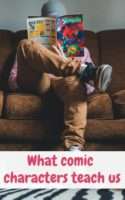When I was just a young comic book enthusiast, I was captivated by the awe-inspiring heroes and their unwavering dedication to using their extraordinary powers for the greater good. Like Uncle Ben wisely told Peter, the iconic Spider-Man, “With great power comes great responsibility.” Witnessing these heroes embrace their responsibility ignited a deep admiration within me, fostering an enduring love for the world of superheroes. As I grew older, my perspective began to evolve, and I started to gain a nuanced understanding of certain villains—not to condone their actions but to grasp the complex motivations that drive them.
Comics have always served as an endless source of entertainment, captivating readers of all ages across the globe. The never-ending battle between Marvel and DC, the two giants of the comic universe, continues to divide fans and spark impassioned debates. Marvel enthusiasts argue that DC is too dark, with an abundance of godlike heroes and villains, while DC fans counter that Marvel leans too heavily towards lightheartedness and humour. However, both factions can find common ground in realising that comics offer profound insights into the human experience. They serve as a keyhole through which we observe the world, broadening our perspectives on ourselves, society, and the intricate tapestry of the human condition.
At the heart of the human condition lie the pivotal events that shape our lives: birth, learning, emotion, morality, and conflict. In comics, superheroes and their nemeses grapple with complex emotions tied to their journeys and evolving understanding of the world. The common thread between these champions and evildoers is the domino effect—an inciting incident that alters the course of their lives. Often, these events take the form of traumas or experiences that leave an indelible mark on their psyche.
Consider the tragic story of Batman, the iconic Dark Knight. A young Bruce Wayne witnesses the heart-wrenching murder of his parents during a fatal mugging in a dimly lit alley following a blissful evening at the movies. This devastating loss ignites an unyielding fire within Bruce, compelling him to adopt the persona of Batman, a relentless harbinger of justice. His relentless pursuit of justice stems from a desire to avenge his parents and ensure that Gotham City remains crime-free. In his early years, Batman dishes out merciless punishment, but he soon realises that this approach brings him no solace. Then, he establishes a strict no-kill policy, offering criminals an opportunity for redemption. Even when faced with his parents’ killer, Joe Chill, Batman finds himself torn and refrains from pulling the trigger.
Batman emerges as a symbol of hope and justice in Gotham City, embodying the standard against which the law must be measured. Yet, he exists as a vigilante, operating beyond conventional legality. Public perception of Batman is heavily influenced by personal experiences and beliefs—vilified by criminals and adored by the law-abiding citizens he protects. However, his actions place him at odds with the authorities, as he operates outside the confines of the law, inspiring others to take justice into their own hands.
On the other end of the spectrum, we encounter the legendary villain Magneto in the X-Men saga. Initially, Magneto stands alongside his friend Professor Charles Xavier, united in their fight for the greater good. However, witnessing the world’s relentless discrimination against mutants, Magneto diverges from Xavier’s path, opting to defend his kind by any means necessary. He becomes a hero to mutants, a guardian protecting them from the fear and persecution inflicted by non-mutants who view their godlike powers as potentially threatening their existence. Magneto himself endures the trauma of discrimination, constantly targeted by attempts on his life solely because he is different. Unlike Professor Xavier, Magneto does not seek to prove his inherent goodness to the world; instead, he retaliates with violence, driven by a belief that power must be met with force.
These intricate characterisations reveal that heroes and villains are far from one-dimensional; they possess multifaceted identities that reflect the intricacies of the human condition. The narratives depicted in comics provide a profound opportunity for introspection, encouraging us to examine the events that shape our lives. For me, this reflection centres around my absent father—a domino that profoundly impacted my life. In response, I have committed myself to breaking the cycle of trauma and becoming the best father I can be. I strive to embrace the role of a superhero in my son’s life, using my experiences to guide me towards choices that promote goodness and love, steering clear of the path of a villain.
In comics’ colourful and captivating world, we find a mirror reflecting our struggles, triumphs, and choices. As we delve into these narratives, we embark on a journey of self-discovery, gaining invaluable insights into the human experience. So, let us look within ourselves, reflect upon the events that have shaped us, and seize the opportunity to become the heroes of our own stories, choosing to do good and inspire others.
***
Tell us: How have comic heroes and villains inspired you to reflect on your choices and navigate the world’s complexities?
Read more here on what schools fail to teach you.


